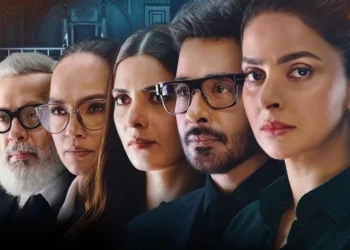He may have conceded defeat in Uttar Pradesh, Bharatiya Janata Party’s stronghold, but India’s right-wing Narendra Modi is all set to reprise his role as the country’s prime minister for the third time. For many on the left end of the political spectrum or the ones styled as simply undifferentiated critics of the right, Modi’s long reign chronicles a steadily rising conservatism.
Gone are the days of Project Milaap, brought to you by a romantic Shah Rukh fashioned more into a utopian Fevicol of political discord than a pragmatic broker of peace. 20 years after Veer Zaara, BJP’s consecutive tenures under Modi’s leadership have all but mainstreamed the F-word charge. Fascism may not be the official policy but Bollywood’s new wave of films is certainly embracing all its tools.
Recent disappointments such as Fighter and Akshay Kumar’s regrettable string of jingoistic films (including Bell Bottom and the upcoming Sky Force) have given cinephiles much to lament. Beyond the poorly executed anti-Pakistan propaganda, there is a deeper sense of loss for the vibrant cinema that flourished before India went saffron. As we reminisce about the golden era of cinema across the border, here are five political thrillers that boldly looked the establishment in the eye.
Chakravyuh (2012)
In the politically charged film directed by Prakash Jha, Adil Khan (Arjun Rampal), a distinguished police officer, is assigned to the volatile region of Nandighat following the deaths of 84 policemen and CRPF soldiers. He soon discovers that the area is firmly under Maoist control, led by the enigmatic Rajan (Manoj Bajpayee). Despite his powerful position as SSP, Adil finds himself outmaneuvered at every turn.
Enter Kabir (Abhay Deol), Adil’s aimless yet loyal friend, who proposes a daring infiltration plan. However, as he delves deeper, he begins to empathise with the plight of the rural poor, displaced and exploited in the name of development. His growing bond with Juhi (Anjali Patil), a dedicated Maoist, deepens his internal conflict. Kabir is torn between his loyalty to Adil and his newfound understanding of the Naxalite cause. This gripping story thrusts Kabir into a labyrinth of moral dilemmas, where every choice has far-reaching consequences.
Maachis (1996)

Amid the turbulent landscape of 1980s Punjab, Maachis delves into the violent aftermath of Operation Blue Star, Indira Gandhi’s assassination and the 1984 Sikh Massacre. Written and directed by Gulzar, the narrative unfolds through flashbacks, centering on Jaswant Singh Randhawa, his sister Veerendar “Veeran,” and their friend Kripal Singh. The peaceful lives of these villagers are shattered when Jaswant is brutally tortured by police for a prank. In his quest for justice, Kripal seeks out militant groups, led by the enigmatic Sanathan, to avenge his friend’s suffering.
Kripal’s transformation from an innocent villager to a militant is driven by his struggle against a system that dehumanises and oppresses. As he integrates with the group, he learns the harsh realities of political and religious manipulation. Sanathan, a survivor of Partition and the anti-Sikh riots, epitomises the resistance against systemic injustices. Kripal’s mission to assassinate a corrupt police officer propels him further into the insurgent world, blurring the lines between right and wrong.
Haider (2014)

After composing the iconic soundtrack for Maachis, Vishal Bhardwaj would go on to direct Haider, set in the insurgency-ridden Kashmir of 1995, is a poignant adaptation of Shakespeare’s Hamlet. The story begins with Dr Hilaal Meer performing an emergency appendectomy on a militant leader, leading to his arrest during a military raid. His son, Haider (Shahid Kapoor), returns from university to find his father missing and his mother, Ghazala (Tabu), disturbingly close to his uncle, Khurram (Kay Kay Menon).
Haider’s quest for truth leads him to Roohdaar (Irrfan Khan), who reveals that Khurram betrayed Hilaal to the authorities. Enraged, Haider spirals into a cycle of madness and vengeance, publicly denouncing the government and the Armed Forces Special Powers Act (AFSPA). His actions culminate in a tragic showdown that tests his moral boundaries and the very fabric of familial loyalty.









